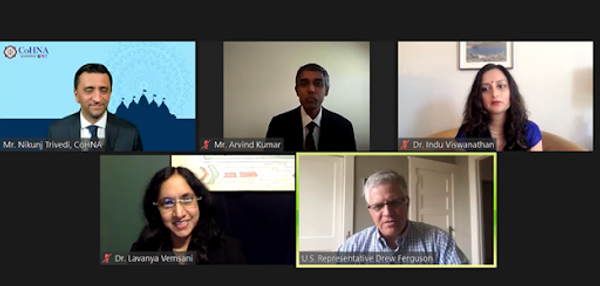New Jersey, September 9, 2021: Hindu Americans apprised members of Congress and their staff on instances of systemic biases against the Hindu American community in a historic briefing session sponsored by the Coalition of Hindus of North America (CoHNA). Congressman Drew Ferguson (R., GA) joined the briefing held yesterday, September 8, 2021, to learn more about issues impacting the community.
The briefing marks the first time Hindu Americans have approached members of the U.S. Congress regarding Hinduphobia and the anti-Hindu sentiment rapidly overtaking the narrative about Hinduism and Hindus as people. The session, which was attended by several Congressional staffers and local lawmakers from both parties, pointed out a pattern of gatekeeping and exclusion that has been developing over the past several years with regard to practicing Hindus. This includes biases in federally funded school curricula, silencing of Hindu students who speak up and the prevailing prejudice against Hinduism in university departments and department sponsored events.
“I thank you for raising this topic and for sharing your experience. I find this silencing to be unacceptable and contrary to American values,” said Congressman Ferguson. “I am very supportive of this process and want to learn more. The Hindu community has my full support, and I look forward to exploring this issue in more depth with my colleagues.”
Speakers included Dr. Lavanya Vemsani, an award winning scholar and Professor of History at Shawnee State University, Dr. Indu Viswanathan, Co-Director of the Understanding Hinduphobia Initiative, Arvind Kumar, President of CAPEEM and Nikunj Trivedi, President of CoHNA.
“We thank Honorable Congressman Drew Ferguson for supporting this historic briefing and wanting to learn more about the challenges facing the Hindu American community,” said Nikunj Trivedi. “Our goal was to share data and the experiences of Hindu Americans young and old, who have struggled against prejudice, silencing and denial of resources/opportunities for no reason other than pride in their faith. This vilification is all the more shocking, coming at a time when diversity and inclusion are celebrated and embraced.”
The Congressional Briefing highlighted a series of Hinduphobic incidents at a range of universities (Rutgers, UPenn, UC Davis and others) over the past few years to help congressional staff understand the sweeping scope and depth of the problem. Focusing on academia, Dr. Vemsani drew attention to the problematic presentation of Hindu history, replete with out-of-context generalizations and false equivalences, that has led to vilification and persecution of this micro-minority. Hindu sacred texts, deities, practices and beliefs are continually misinterpreted with racial undertones and colonial theories. Academics, students and scholars who speak against this one-sided and often false narrative are labelled as “Hindutva” in an attempt to silence them.
The very places of higher learning that are supposed to foster knowledge and encourage tolerance and pluralism of thought, are becoming venues of hate incidents against Hindus. “I was labeled ‘Hindutva’ for simply being an academic with differing viewpoints,” said Dr. Vemsani, adding that “Hate against Hindus might be under-reported due to a general fear of drawing attention in the process of calling out and reporting it. This is something that needs to be investigated.”
Peppering her testimony with poignant stories of Hindu students who have been shamed and silenced, Dr. Indu Viswanathan highlighted how anti-Hindu bias manifests both through direct speech and through the silencing of speech - a pattern especially aggressive in colleges. “Hinduphobic rhetoric strives to keep Hindu American students from being included as equal members of American society,” she said. Common themes include amplifying the voices of openly Hinduphobic agents, denying Hinduphobia, erasing Hindu persecution, and labeling anyone who disagrees with these as a political extremists. “[The upcoming Dismantling Global Hindutva Conference’s] stated goal is to create public educational curricula that extend and normalize these assumptions,” she added. It's an overt erosion of the first amendment rights of Hindu Americans - something that no community's children and youth should face.
Arvind Kumar shared experiences from his long legal battle for the equalization of educational materials and the portrayal of Hinduism in California's middle school textbooks. Over the course of two lawsuits that challenged the hostile anti-Hindu narrative in California’s textbooks as well as official curriculum policy documents, his group encountered blatant double standards as it sought to get equal treatment under California’s specific education codes prohibiting negative description of any religion.
The panel called upon congress to conduct a formal hearing on the biases against Hinduism in federally funded programs and in various branches of the federal government and follow it up with a formal investigation and appropriate punitive measures against those in charge of the biased programs and institutions.
A lively Q&A session chaired by Congressman Ferguson delved deeper into the causes for hate against Hindus and the silence surrounding it. The panel agreed it is important for Congress to examine the extent of misinformation and the incidents of bias against Hindu students, staff, and faculty in universities across the USA and consider ways to counter such types of misinformation.
A link to the complete recording can be found here.

